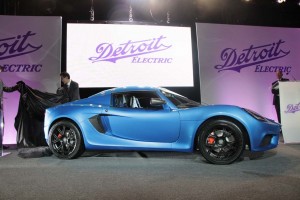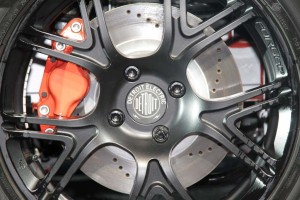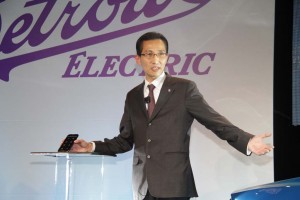Detroit has become home to a fourth U.S. automaker, albeit one with modest if promising ambitions to do things quite differently from the familiar Big Three.
Reviving a brand name that last built cars nearly three-quarters of a century ago, a small group of automotive and consumer electronics veterans have resurrected the old Detroit Electric badge and promise to have their first new product, the SP:01 sports car, in production by late this coming summer.
Made of exotic lightweight materials including bonded aluminum and carbon fiber, officials promise the Detroit Electric SP:01 will be the fastest battery-electric vehicle, or BEV, on the market, launching from 0 to 60 in 3.7 seconds and topping out at 155 mph. They also promise a range of up to 180 miles per charge.
And while the first offering will carry a steep price, $135,000 before federal and other credits, the start-up maker is promising to follow up with four more mainstream models, including two due next year that will come in at barely a quarter of the SP:01’s price.
Admitting he initially expected to be “laughed out the door” when he first proposed the project, 50-year-old Albert Lam, Detroit Electric’s new CEO, declared the maker had “put a stake in the ground” with its formal announcement and unveiling of the SP:01 on Wednesday night. But he also acknowledged that the company has a lot to prove, suggesting, “The difference between sanity and insanity is the realization of a dream.”
The original Detroit Electric produced about 13,000 vehicles between 1907 and 1939, and drew some high-profile clients that included Thomas Edison, John D. Rockefeller, Mamie Eisenhower and even Clara Ford, the wife of automotive pioneer Henry Ford. The maker was considered one of the most advanced of the era’s many electric vehicle manufacturers – even setting a record for its day with a vehicle that yielded over 200 miles on a single charge.
Range is today even more critical to making battery vehicles appealing to a mass market, stressed Lam, a former executive with Lotus Engineering and, before that, with Apple.
Borrowing a page from California-based rival BEV maker Tesla Motors, Detroit Electric plans to offer customers the option of different battery packs that can extend the range of the company’s products – at a cost of course.
Detroit Electric plans to use lithium-polymer technology, rather than the similar, though bulkier lithium-ion packs used by most other electric vehicle makers. It plans to source the technology from two different makers, Cochem and a South Korean manufacturer not yet identified.
In fact, suppliers will become an even more critical part of Detroit Electric’s business strategy than for more traditional automakers, stressed Lam and Don Graunstadt, the maker’s head of North American operations. Detroit Electric has lined up “strategic investors” and other partners to take on production of virtually all key components, everything from the batteries and electronic control systems to “the boring stuff,” said Lam, like chassis and body manufacturing.
While Detroit Electric plans to set up a small factory in Detroit to handle final assembly of the extremely low-volume SP:01, it plans to outsource most of the work on future models to any of a number of vendors who have open capacity. While officials wouldn’t say whom they have begun negotiations with two possibilities came up in a conversation with reporters: Canada’s Magna International and Finland’s Valmet, which already has served to assemble the Fisker Karma plug-in hybrid.
Some final assembly operations will remain in the U.S., possibly Detroit, stressed the Hong Kong-born Lam, declaring the new maker “an American company.”
The alternative approach to manufacturing might carry its risks, but Graunstadt stressed it also had key advantages in terms of launching a new company. “We would probably have to borrow $800 million” to set up a conventional manufacturing operation,” he suggested, adding that there would “not be enough in sales (at least initially) to support that kind of investment.”
Indeed, Fisker’s current financial plight appears to be linked to the need for more money to tool up a plant for its second product, the Atlantic.
All told, Lam revealed that Detroit Electric is “looking to raise between $50 million and $100 million” to fund its venture. A sizable chunk has come from “sweat equity” and the investments from initial management and strategic investors who hope to lock up business from the company.
There are no plans to seek government funding, he insisted, whether from the U.S. or abroad. And while there are some investors lined up from the U.S., Europe and Asia, Detroit Electric will specifically avoid any from China that might have ties to official channels because “it gets very complicated.”

The SP:01 features a carbon fiber body and bonded aluminum chassis -- but future models will be more conventional in construction.
Detroit Electric’s plans are nothing if not ambitious. The company plans to select a factory site by the end of April and have limited production of the largely hand-assembled SP:01 underway by August, with the first cars going to market a month later.
Based on a Lotus design, the coupe will feature a bonded aluminum chassis and a carbon fiber body, the total package weighing in at just “2,403 pounds of sheer driving pleasure,” declared Lam, as he rolled back the covers.
The SP:01 will be powered by a single AC synchronous motor producing 201 horsepower through a choice of either a four-speed manual or a 2-speed power-shift transmission. The maker will offer buyers the ability to unlock a fifth gear with the manual to boost top speed to 155 mph. Detroit Electric will be the first major producer of a passenger electric model to go with a multi-speed transmission, a challenge that has stymied key competitors including Tesla.
The company expects to produce just 999 of the sports cars – a strategy that echoes Tesla’s own approach with the earlier Roadster model that eventually led to the launch of its own Model S last year.
Detroit Electric will also follow with two more mainstream models in “late 2014,” according to engineering chief Ben Boycott. Smaller than the Model S, they will be a sedan and a hatchback carrying starting prices in the $32,000 to $35,000 range.
To expand the appeal of the company’s battery technology, Lam has drawn on his consumer electronic experience. The SP:01 will feature a Smartphone Application Management Interface, or SAMI, that will serve as its source of infotainment – the car has speakers but no radio – and allow an owner to do things like pre-heat or cool the sports car or set charge timing. Using a 240-volt charger it needs about four hours to be fully ready to go.
One of the more intriguing features on SAMI is the ability to extend the range of the SP:01 in an emergency by tapping about 20% of the battery capacity normally reserved to maximize life.
Lam later told TheDetroitBureau.com that Detroit Electric is working up a hybrid lease/purchase program similar to one announced this week by Tesla that would set a minimum residual value for its products after five years. Buyers could also swap out older batteries at a set price.
Meanwhile, Detroit Electric products will be offered with a system designed to detect if an owner’s home experiences a power blackout. If that happens, the device will send an alert through SAMI asking if the battery car should tap its own power to keep things running for up to 2.5 days.





Sorry but this business model doesn’t seem viable, IMO. Yes I understand that those of means buy toys like this to be seen and heard talking about saving the environment and being “green”. Unfortunately there is a very limited number of folks like this and numerous small EV makers trying to acquire these people as customers.